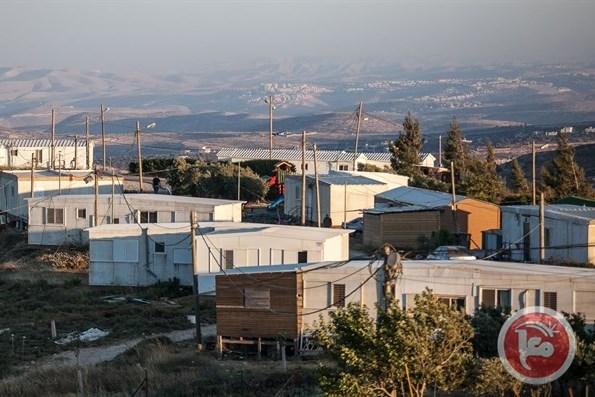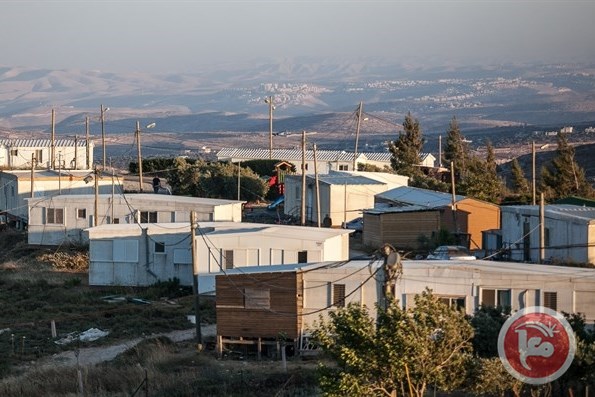Ma’an News Agency | – –
BETHLEHEM (Ma’an) — Israel’s Ministerial Committee for Legislation Sunday evening unanimously approved a law that would retroactively legalize outposts in the occupied West Bank, a decision Israeli human rights group Yesh Din said “exposes (the Israeli) government’s intention to annex the West Bank to Israel without affording its residents civil rights.”

The decision came despite Israeli Prime Minister Benjamin Netanyahu’s wish to delay the decision, and despite the Israeli attorney general warning to the committee that he would not be able to defend the the so-called “Formalization Bill” in the Supreme Court, as it contravenes international law and that there was no legal precedent for the expropriation of lands privately owned by Palestinians.
While the some 196 illegal Israeli settlements in the occupied West Bank and occupied East Jerusalem are considered illegal under international law, a further 232 settler outposts were also considered illegal by Israeli domestic law. However, Israeli authorities have often individually legalized outposts retroactively by declaring them official settlements.
Netanyahu had implored that the vote be delayed until the Israeli Supreme Court reached a decision whether or not to postpone the evacuation of illegal Amona outpost after the attorney general reportedly warned that voting on the bill prior the court decision would “would significantly harm” the changes for postponement.
The Israeli State Attorney’s office had requested the postponement on the basis that it could not arrange alternative housing for the residents of Amona before the target evacuation date of Dec. 25 this year, with Palestinian landowners filing an appeal to the Israeli Supreme Court last week rejecting the demands to postpone.
The legislation that was passed Sunday evening, after facing a revision, would apply only to settlements established with the involvement of the state — which includes Amona, but not to those that were establishment without state involvement.
The Amona outpost was slated for demolition following a 2008 Israeli Supreme Court decision after eight Palestinians from neighboring villages — with the support of Yesh Din — successfully petitioned the court to remove the outpost on grounds that the construction was carried out on privately owned Palestinian land.
After years of appeals from right-wing Israeli government officials, and attempts by Amona settlers to prove they had legally purchased the land, an Israeli police investigation in May 2014 found the entirety of the outpost to have been built on private Palestinian lands, and that the documents used by Amona residents to try claim their “purchases” were in fact forged.
Meanwhile, Jerusalem Mayor Nir Barkat warned on Monday that any dismantlement of the illegal Israeli outpost Amona in the occupied West Bank would be followed by the mass demolition of Palestinian homes lacking Israeli-issued building permits in East Jerusalem.
Following news of the law’s passage, Yesh Din on Twitter called the bill “a legal stunt designed to sanction takeover of Palestinian land in the West Bank,” saying it “exposes (the Israeli) government’s intention to annex the West Bank to Israel without affording its residents civil rights.”
“The bill is discriminatory and authorizes confiscation of Palestinian landowners’ ability to use their land denying them the right to appeal.”
Human rights groups and international leaders have strongly condemned Israel’s settlement construction, claiming it is a strategic maneuver to prevent the establishment of a contiguous, independent Palestinian state by changing the facts on the ground.
Meanwhile, some members of Israel’s parliament, the Knesset, have publicly announced their support for plans aimed to annex the entirety of Area C — the area of the occupied West Bank under full Israeli security and civilian control.
While members of the international community rested the solution to the Israeli-Palestinian conflict on the discontinuation of illegal Israeli settlements and the establishment of a two-state solution, Israeli leaders have instead shifted further to the right.
A number of Palestinian activists have criticized the two-state solution as unsustainable and unlikely to bring durable peace, proposing instead a binational state with equal rights for Israelis and Palestinians.



 © 2026 All Rights Reserved
© 2026 All Rights Reserved